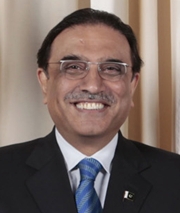Pakistan seeks IMF help
27 Oct 2008
After strenous denials from the Pakistani government that it was seeking an IMF loan and that a loan from the IMF would be the last resort, IMF managing director Dominique Strauss-Kahn confirmed last week that Pakistan had requested discussions with the fund ''to meet the balance of payments difficulties the country is experiencing as a result of high food and fuel prices and the global financial crisis.''
 Pakistani officials and the IMF team are camping in Dubai and have been holding meetings since last Tuesday to discuss details of the country's financial restructuring plan.
Pakistani officials and the IMF team are camping in Dubai and have been holding meetings since last Tuesday to discuss details of the country's financial restructuring plan.
According to reports, Pakistani government officials have said that the amount of the loan had not yet been finalised, and it would be a stand-by agreement for two years.
Over the past year, Pakistan's economy has crumbled because of sagging foreign investments due to terrorist attacks, budget deficits fuelled by soaring import bills and high crude prices even as Pakistani exports declined.
Seeking the IMF loan is indeed the last resort for Pakistan as the newly appointed Pakistan Asif Ali Zardari went to its steadfast ally, China last week and signed a series of accords, including the construction of new nuclear power plants to offset the India-US nuclear deal but the $3-billion loan that Pakistan wanted from China was not forthcoming and the US did not bail it out caught as it was in solving its own economic woes.
President Zardari is now headed to Pakistan's long-standing benefactor Saudi Arabia to plead for an immediate loan of $2 billion, which it requires to shore up its foreign currency reserve that slumped to $7.75 billion and is sufficient to sustain only six weeks imports.
Finance adviser Shaukat Tareen told a press conference last wek that the country required an immediate $3.5 billion to $4.5 billion to prop up its foreign currency reserves and up to $8 billion more to repay sovereign debts that are due to mature in 2009.
He said that "Pakistan cannot wait for long ... Pakistan has to take action in the next 30 days and China and Saudi Arabia are likely to make huge commitments."
According to the IMF, Pakistan's economy has "deteriorated significantly" and has forecast a growth rate of 3.5 per cent, with inflation at a 30-pe cent high of over 24 per cent.
Apart from seeking the unspecified sum from the IMF, Pakistan is also looking for economic assistance from the Asian Development Bank, the Islamic Development Bank, and friendly donor nations who are meeting in Abu Dhabi in the middle of November, under the banner "friends of Pakistan."
Former World Bank vice-president Shahid Javed Burki has said that Pakistan is a position to garner $40 billion to $50 billion from international donors to ward off the current crisis.
He told Pakistan's Dawn, "There's an appetite in the world for helping Pakistan," and the country just needed to to come up with credible programmes that can translate "this interest into financial assistance."
Pakistan announced on Saturday that Chinese bankers would be visiting soon to assess Pakistan's needs, and Chinese companies had pledged to invest $1 billion by next June.
The IMF has asked Pakistan ahead of the talks to reduce its spending on arms by 30 per cent as a pre condition for the loan, which is bound to raise the hackles of the country's generals. One senior military commander was quoted as saying in Pakistan dailies that even a cut of 10 per cent would rip the heart of the military in its fight against terror.
Of late Pakistan has been trying to impress the Bush administration by talking tough on militancy, saying that it would only negotaite with those militants who renounced violence and laid down their arms.
Pakistan's hopes that the tough stance it has taken against the terrorists would make Washington more inclined to support its case for IMF funding.



.webp)
.webp)

.webp)
.webp)

























